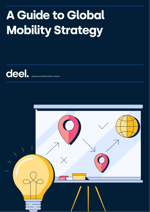
Employee Mobility & Employee Relocation Packages Explained

Key takeaways
- An employee relocation package is a benefit a company provides to assist new and current employees in moving from one location to another.
- Employers must go beyond a typical relocation package that covers relocation costs to include education, visa and immigration support, and flexible benefits.
- Organizations must build an inclusive and transparent company culture to ensure mobility is an opportunity for all employees.
Mobility provides a range of benefits to both employees and businesses. Businesses with high employee mobility benefit from increased employee engagement and retention, greater workforce diversity, and the ability to mobilize a global workforce, expand into cross-border markets, and build a skilled and culturally intelligent workforce.
Mobile employees benefit from increased job satisfaction, work-life balance, and access to unique learning and development opportunities and cultural experiences.
However, not all employees have access to the same mobility opportunities, which is why a relocation package can be helpful. An employee relocation package is a benefit that companies provide to assist new and current employees in moving from one location to another.
Before we dive into the qualities of an effective relocation package, let’s first run through four factors that can impact an employee’s mobility.
4 factors that impact an employee’s mobility
Long-standing social discrimination, family logistics, and lack of equal representation can consciously or unconsciously exclude certain groups from mobility opportunities. We explain these factors in more detail below.
1. Circumstantial constraints
Family logistics and finances are often the main barriers to mobility for employees. Homeowners, non-married couples, parents with young children, single parents, and employees with carer responsibilities for elderly relatives or those with disabilities are most likely to miss out.
2. Perceived or actual risk and viability
Traveling or relocating to a new country can involve a certain degree of risk, particularly in non-diverse countries with different cultural norms.
Risk can range from subtle cultural issues with low impact on an employee’s daily life, moderate problems such as legal restrictions, visa issues, and fines to more severe problems and consequences such as violence, criminal charges, imprisonment, or even death.
While it may ultimately be the employee’s decision regarding what level of risk they’re comfortable with, organizations have a duty of care, especially if business objectives drive the location choice.
In addition to risk, not all employees are eligible to travel or relocate to certain countries. Doing so could result in costly compliance issues for the employee and the business.
Borderless hiring without the hassle

3. Unconscious bias and discrimination
Long-standing social discrimination can cause management and company policy to consciously or unconsciously exclude certain groups from mobility opportunities.
Historically, organizations designed mobility programs for traditional Western expatriates with trailing female spouses and children attending international schools. These policies aren’t suitable for single parents, workers with caring responsibilities, employees with disabilities, and other groups with specific requirements.
4. Lack of mobility experience and representation
Not everyone has the opportunity to travel, relocate, and develop international experience, whether because of their nationality, ethnicity, religion, gender, age, sexual orientation, disability, personal choice, or perceived or actual risk.
Evidence shows that women and some minorities are on the wrong side of the mobility divide. Mercer’s Worldwide International Assignment Policy and Practices survey revealed that women represent only 14% of the expatriate workforce globally. The best-performing countries and industries figures remained at 20-30%.
This divide has caused a skills gap that can render minorities incapable of pursuing mobility opportunities. At the same time, employees from these groups might dismiss themselves due to the perceived lack of practical support and absence of role models in the mobility field.
What to include in a relocation package to boost equal opportunities
For mobility to be an opportunity for employees, your relocation package must go beyond financial aid to ensure employees receive incentives, education, and support. Here’s what an effective relocation package includes:
Skill workshops and cultural training
Workshops and training sessions can help marginalized communities develop the knowledge, skills, and networks to embrace mobility opportunities. Through these sessions, employees can learn about international travel, safe house hunting, typical moving expenses, tax liability, finding health insurance coverage, and more.
Cultural training sessions can help employees assess a new city, state, or country based on their desired lifestyle, culture, language, cost of living, and quality of life. They can also help eliminate preconceptions, homesickness, and culture shock.
Visa and immigration support
Before a new hire or current employee can relocate, they must qualify for certain visas, and work permits to comply with local laws. Visa application processes are often time-consuming and demand a lot of paperwork and research to complete.
Incorporating visa and immigration support into your relocation package will ensure that employees receive the support they need. At Deel, we assess your employee’s eligibility, employ them through our employer of record (EOR) solution, and handle the entire visa application process in-house, taking the burden off your human resources team and providing an excellent relocation experience.
We also ensure your workers remain compliant in any country, even as independent contractors. We check classification, localize contracts, and collect all the tax, permit, and compliance documents
Masha Sutherlin, Director of Global Corporate Legal and Mobility, Deel
Flexible benefits
Flexible cafeteria-style benefits and perks enable workers to choose what’s relevant to maintain their lifestyle, help them be mobile, and support their families.
You could introduce the following:
- A childcare allowance
- A stipend for older employees to care for elderly parents
- A reimbursement scheme to cover moving costs and transportation costs such as airfares, house hunting trips, temporary housing, household goods, moving services, relocation assistance fees, packing and unpacking services, and any related expenses
- Property management or real estate solutions for homeowners and renters to help with the home sale and property leasing
Offering flexible travel and relocation benefits can be a massive undertaking for your HR department. Deel takes care of the whole process of offering, reimbursing, and tracking the use of global benefits and perks and ensures movers receive the correct mandatory benefits in line with local employment laws.
Masha Sutherlin, Director of Global Corporate Legal and Mobility, Deel
Settling in period
To combat the disruption that often comes with relocating employees, companies should factor in a settling-in period into the relocation package—providing the worker with a couple of weeks leave or a temporary reduction in responsibilities to address any life admin such as setting up bank accounts, enrolling children in schools, and getting familiar with their new home.
Any support or information you can provide to help employees and their families during this process will be beneficial. Consider compiling a relocation guide or checklist to provide your employees with clear guidelines on relocation eligibility, requirements, support, procedures, and best practices.

How to ensure your employee relocation package is successful
While an enticing job relocation package is a great start, building a company culture that supports the uptake of mobility opportunities is essential. Take the following steps:
Update your mobility policy and train management
Create or revise company policy to communicate the company’s intentions to remove barriers to mobility for all employees. Involve diversity teams in mobility discussions and train management on eliminating prejudices and discriminatory practices.
Use our free Employee Relocation Policy Template to get started.
Introduce mobility role models
Provide a point of contact or mentor that can act as a role model and support current or new employees during the relocation process.
Monitor equal opportunities
Companies can develop employee surveys, pulse surveys, and mentor check-ins to gauge whether employees feel they have equal access to mobility opportunities and how this impacts their overall job satisfaction and career success.
Survey questions could include:
- Do you feel that mobility is an option for you? If not, why?
- What barriers prevent you from pursuing mobility opportunities?
- What could the company do to help you take advantage of mobility opportunities?
Organizations can use this information to identify potential barriers and provide support.
Masha Sutherlin, Director of Global Corporate Legal and Mobility, Deel
Foster open communication
Fighting the unconscious bias linked to global mobility requires employees to feel comfortable opening up and coming forward with their problems and concerns.
Management should build trust and transparency within their teams through regular 1-on-1 check-ins and team-building activities.
Provide alternative mobility opportunities
Provide employees who cannot take advantage of mobility opportunities due to personal circumstances with alternative mobility opportunities such as working holidays, extended business trips, short-term assignments, and virtual assignments where a worker performs a role remotely for a new location.
Adopt a global compensation strategy
Instead of providing an upfront lump sum, stipend, or employee relocation allowance to offset relocation expenses, consider adopting a global compensation strategy.
In this scenario, compensation is not impacted by the employee’s location, the company’s location, or the employee’s performance. Instead, all employees with the same role and experience level are compensated equally.
Typically, companies using this strategy base their compensation rates on a high COL city to set and maintain a competitive edge in their industry.
Use Deel’s Salary Insights Tool to view low, median, and high salaries for roles worldwide, giving you valuable insights for designing competitive and fair compensation packages.
For more information on the best compensation approach for your company, check out The Remote Team’s Guide to Employee Compensation Strategies.
Katya Rosadiuk, Global Mobility Manager, Deel
Make mobility an option for all employees with Deel
Employee mobility holds the power to create great employee experiences and opportunities for personal and professional growth while bringing you closer to your ideal business outcomes. But for your mobility strategy to succeed, it needs to be inclusive.
With Deel, companies can make mobility an option for all employees, no matter their background or personal circumstances. Our in-house experts handle compliance, local laws, global payroll, and tax, provide visa and immigration support, and offer customizable benefits and perks so you can offer a far-from-average relocation package.
Request a demo to learn more.


